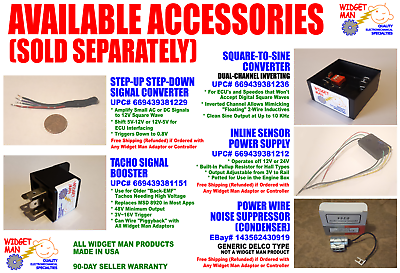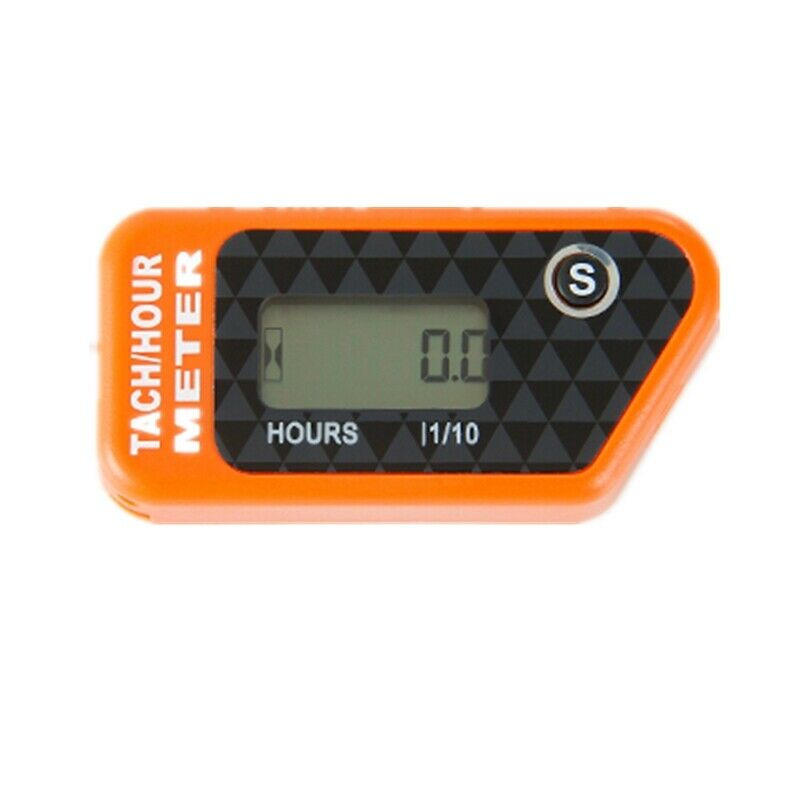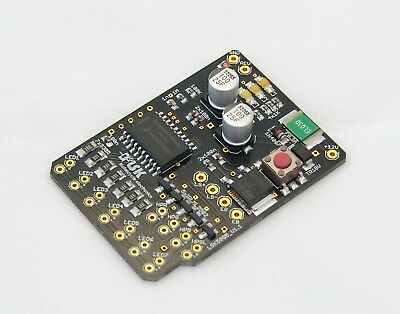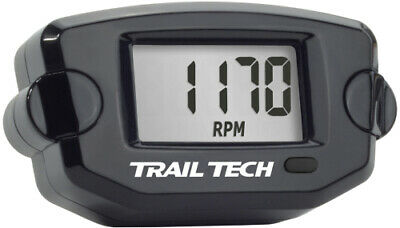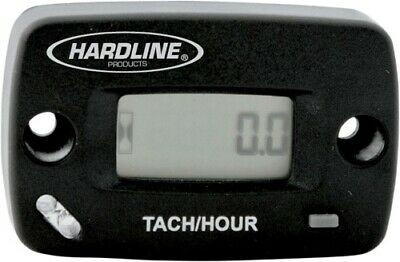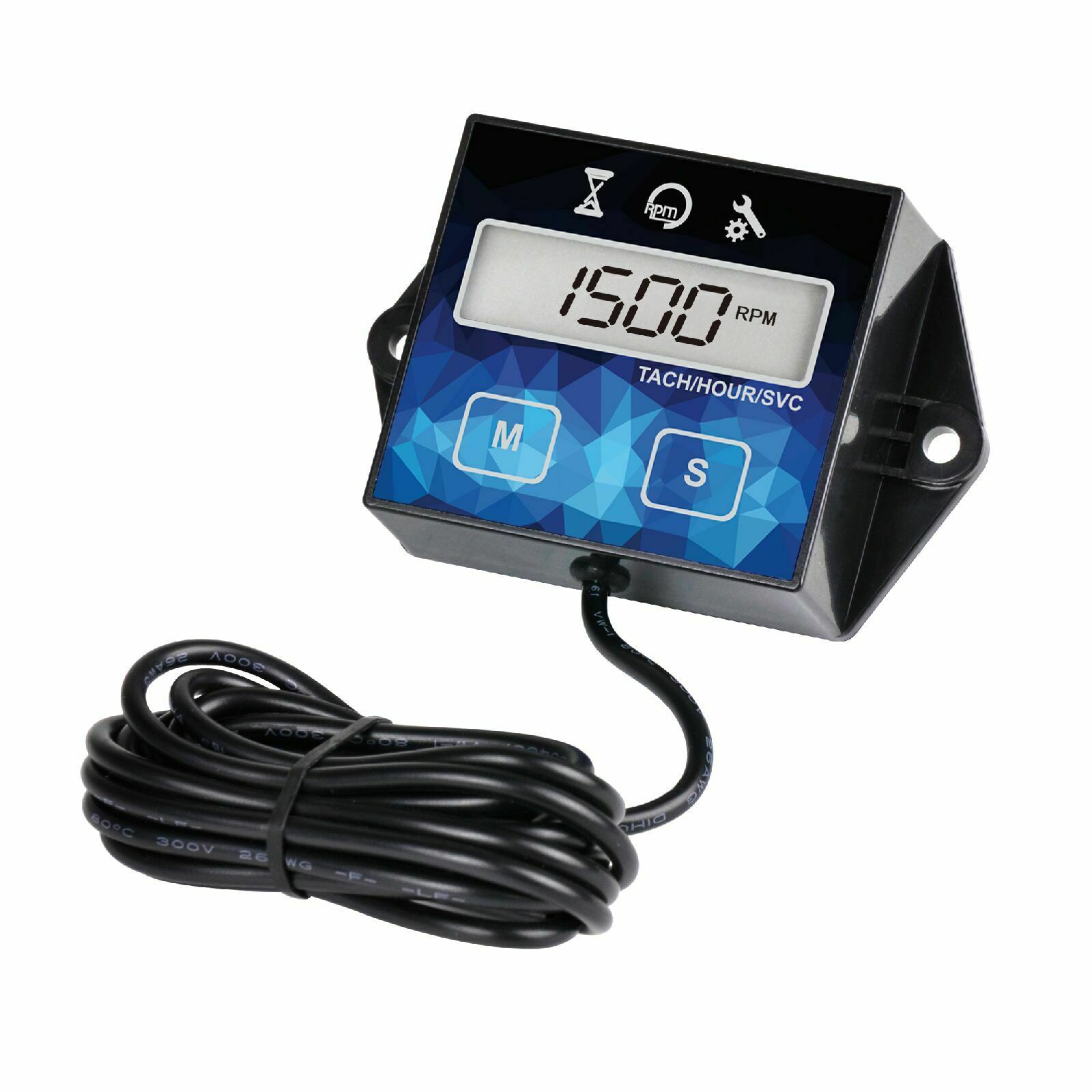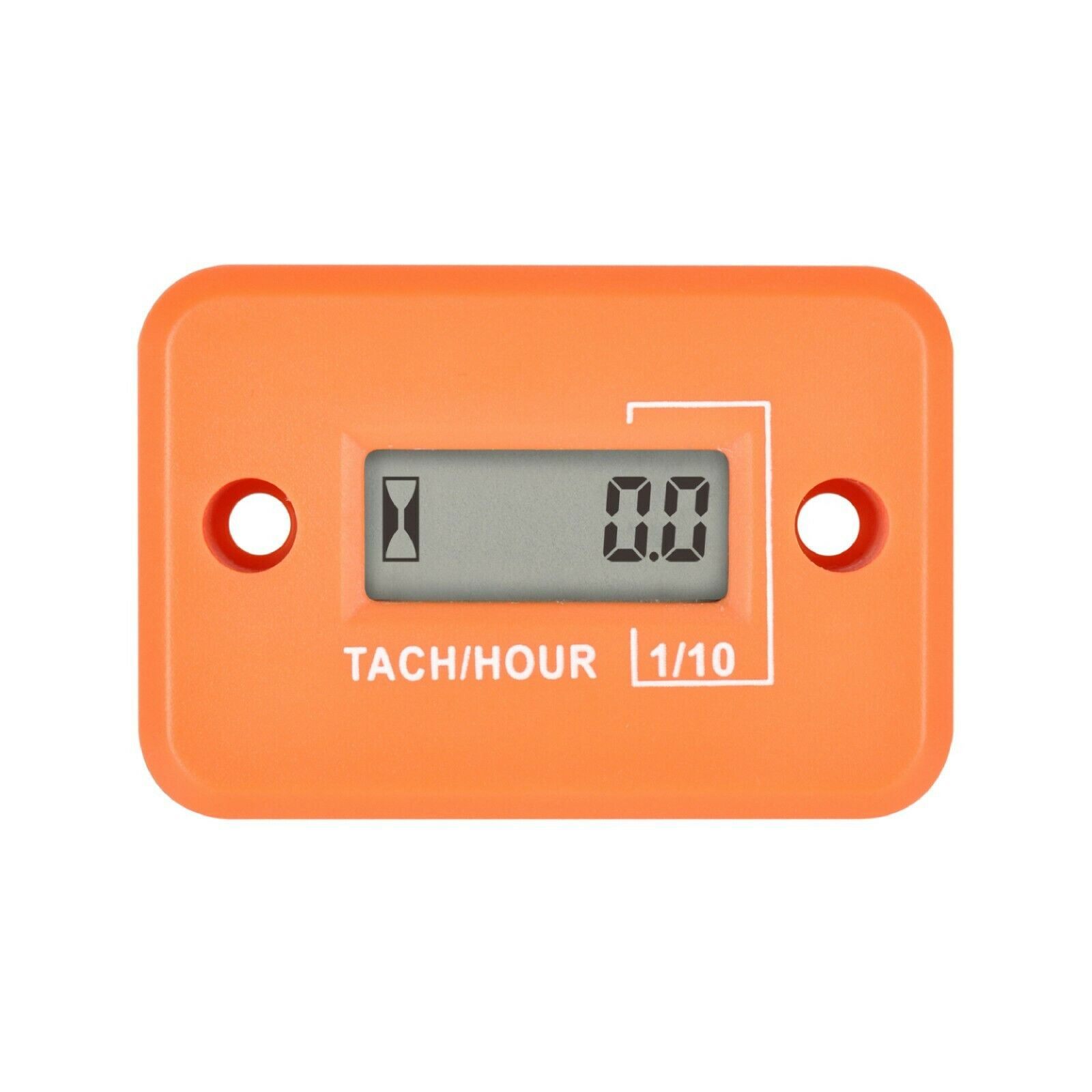-40%
UNIVERSAL TACH ADAPTER / CONVERTER, COP-1-2-3-4-5-6-8-10 cyl to any 4-6-8 Tach
$ 25.76
- Description
- Size Guide
Description
DOCUMENT DOWNLOADS AVAILABLE FOR THIS PRODUCTFAQ:
https://drive.google.com/file/d/1rEtIcIP-wDpxc1zwWm9F_XwoJsrTRCcI/view?usp=sharing
INSTRUCTIONS:
https://drive.google.com/file/d/1sjUW6cCsxLNg37lL2VkwUTE_dEarlEAW/view?usp=sharing
APPLICATION CARD:
https://drive.google.com/file/d/1nxjMPJEvoZk3G4OHt_tnI8ycxKhyVedX/view?usp=sharing
USING PULLUP RESISTORS:
https://drive.google.com/file/d/1QLjjXIbRG744A18xEpcQTxeahPeJVPEH/view?usp=sharing
WM CATALOG:
https://drive.google.com/file/d/1N_T1FOQnUAIDFX7IA6wUgK242Rak9SZ6/view?usp=sharing
ADD A TACH TO ALMOST ANYTHING!
WORKS WITH
SHIFT LIGHT
AND
NITROUS WINDOW
CONTROLLERS TOO!
This sturdy device is perfectly comfortable living on top of a COP coil or on the bottom of a lawnmower. Simple switches program it for anything from screaming 2-strokes to monster V-10's, and it can use almost any 12V input signal, even crankshaft sensors or home-cooked inductives. The number of pulses per revolution is all the info you'll need. It can drive standard tachs (voltage-pulse type) of almost any kind, even 5V OEM units. The hookup is 4 simple wires (power, ground, signal and output) using .25" fastons from any parts store. In most 3-wire COP applications, 3 of the 4 wires can be tapped straight off the handiest coil, with the adaptor mounted right on top. The package comes with full instructions and easy-to-read labels. It also comes with
free email tech support
and a 90-day replace-or-refund warranty (don't smash it, of course, but we ask few other questions).
NEW - We now offer power supply noise filters (condensers) as a courtesy to our customers who may have noisy electrical systems (typically pre-1985 vehicles and most small-engine applications). Shipping is free (refunded) when purchased with any Widget Man adaptor or converter. See listing# 143562430919.
NEW:
IF YOU'RE A PROFESSIONAL DOING FREQUENT ENGINE OR IGNITION SWAPS, THESE ADAPTORS ARE NOW AVAILABLE IN LOTS OF 5 AT SUBSTANTIAL SAVINGS! SEE OUR LISTING# 143420559859.
IF YOU PLAN TO USE THIS DEVICE ON A CAR OR OTHER VEHICLE WITH A LARGE ENGINE, PLEASE SEE MY LISTING
#
141931549970
UNDER
Car & Truck Parts > Gauges > Tachometers
FOR MORE INFORMATION.
IMPROVED! NOW SUPPORTS DIESEL and OUTBOARD ALTERNATORS
The latest version of the UTC has ratios for converting 6-7-9-10ppr!
FOR MOST BIKE OWNERS:
Because the vast majority of bikes use a coil-per-cylinder setup, installing the UTC is usually as easy as finding the handiest coil and determining if your ride is single-fire or dual-fire. My own Kawi Vulcan has the UTC mounted on the front coil beneath the gas tank. The trigger wire is on coil-minus, the power wire on coil-plus, and a ring terminal on a frame bolt supplies ground. The only wire routed up the bars is the output to the tach. In most cases, it really is that simple!
WHEN IT ISN'T THAT SIMPLE:
If your ride uses DIS or for some reason a coil signal isn't available, both old and new bikes offer a variety of other signals the UTC can use. The UTC's tach input can "see" any signal from 4.1~350 volts and has very high signal impedance, so it's perfectly safe to connect it directly to a fuel injector trigger or crankshaft pickup. The most effective route is often to tap one phase of the alternator before it reaches the external voltage regulator. These signals are clean and reliable, and because a bike alternator spins with the crankshaft and not a belt, there are no "fractional ratio" issues like a belt drive. The only information you'll need is the number of "bumps" on the stator and the number of phase wires (2 or 3) coming out of the stator. DIvide the number of windings (bumps) by 2, then divide by the number of phase wires. For instance, a stator with 18 windings and 3 phases will produce 18 / 2 / 3 = 3 pulses per revolution. Whatever signal source you use, please note that UTC needs to see a
voltage
change, it can't sense spark-coil or alternator current like some MSD and Autometer devices.
FOR CDI IGNITIONS:
CDI's are extremely common on bikes and outboards these days. Signal can still be taken off the spark coil, but be aware that all CDI's drive the coil from the
positive
side, not the negative like ordinary ignitions. You can easily identify a CDI by measuring voltage on the negative pin with the engine operating. If it stays near 0V at all times, then the ignition is CDI (coil-negative on a CDI is always connected to ground). Swapping pins is usually all a CDI requires to work with the UTC, it can otherwise be treated like any other high-voltage source. Filtering isn't usually needed because CDI spark pulses are usually much shorter than normal ignitions, so "coil ring" is rarely an issue.
USE WITH LOW-VOLTAGE and DIGITAL SIGNALS (5v, 6V, 12V):
The UTC will work with trigger signals down to 4.1V, and can be used freely with digital or analog sensors at 12V or 5V. However, DIP-switch 7
must
be turned on for the UTC to "see" the signal.
The UTC will not trigger until about 25V with switch-7 in the off position.
USE WITH OEM TACH OUTPUTS:
The UTC will work with
any
OEM tach ouput, but be aware that many OEM outputs are actually internal connections to coil-negative, NOT 12V digital square waves like late-model ECU's. This means they produce very high voltages (up to 450V for some HEI's).
Since turning
switch-7 on disables most of the circuit protection inside the UTC, connecting to voltages above 15V can destroy the unit.
If in doubt, ALWAYS start with switch-7 in the OFF position. Switch it on only if the UTC fails to trigger.
FOR 3-WIRE COP OWNERS ONLY:
Most 3-wire COP triggers produce no inductive "spike" like a coil-minus connection. Most are 12V square waves. For these systems, the UTC needs to operate with switch-7 on, just like connecting to a 12V sensor. However, the same caution applies as connecting to an OEM tach output
(see above)
:
Since turning
switch-7 on disables most of the circuit protection inside the UTC, connecting to voltages above 15V can destroy the unit.
MAGNETO TRIGGERING:
The most practical trigger for the UTC on most magneto ignitions is the "kill switch" wire, but this can be a very noisy electrical place. Various spikes on the line can cause symptoms from double-triggering at low RPM to complete blanking at high RPM. For this reason, the UTC has a built-in RC (resistor-capacitor) filter that you can switch on with one of the DIPs. The built-in value is 100K/0.1uF, but you can increase the filtering simply by adding 10K or 100K resistors included with the kit. If all else fails (and with magnetos it often does), the UTC will trigger by simply wrapping the wire a few turns around a spark plug wire. The number of turns needed will vary from engine to engine, but more turns will always increase the signal strength. Note that switch-7 needs to be ON and 6 OFF when doing a plug-wire wrap.
JUST FOR SNOWMOBILES:
Sleds employ some
very
unique electrical systems, so you should check a few things before you buy and install a UTC First, many OEM tachs on sleds are inductive (current mode) and the UTC cannot drive them. You can check by the number of wires (not counting the light-bulb wires). If it has three (12V, ground, signal), then the UTC will probably work with it. If it only has two (ground and signal), then it's inductive and the UTC can't drive it. Secondly, the tach signal on many sleds comes from one leg of the lighting coil on the magneto. The UTC can use this signal with switch-7 off, but the voltage level is usually 80V+ with high current potential, unlike a coil signal which produces very little current. Even momentarily touching this wire to the wrong UTC terminal
will
burn out the UTC (or any other 12V electronics). Connecting it with switch-7 "on" will also damage the UTC instantly. If you are installing a 3-wire tach on a sled with this type of trigger, use extreme care!
POWER FOR MAGNETO APPLICATIONS:
The UTC needs a DC power source to operate, as do all voltage-mode electric tachometers. If your ride has DC lights, a battery, or both, then you should be able to run the UTC and an electric tach off the electrical system. This includes most magneto-ignition motorcycles that have a headlight but no battery, since these generally have a low-voltage "lighting coil" built into the magneto that can be tapped for DC voltage. If your ride has AC lighting (like some snowmobiles) or no lights and no battery (like most motocross bikes and push lawnmowers), then it may not be possible to add a tach without also adding a DC conversion kit or other specialized hardware to provide a DC supply.
FOR 6V IGNITION OWNERS:
The UTC will work with all 6V systems. If your trigger is coil-negative, hook it up just like a 12V system and leave switch-7 off. However, if your trigger is a 6V level square wave from the system rail, you MUST use it with switch-7 ON.
FOR OWNERS OF 24V and "BACK-EMF" TYPE TACHOMETERS:
Many older tachs require above 12v to trigger, expecting to see the "spike" from a discharging ignition coil. Since the UTC outputs a 12V square wave, it can't drive these tachs without help. What is required is a "coil simulator" (aka "kicker coil") on the UTC output. These are just a high-voltage transistor connected to a small inductor like a relay coil. If you own one of these tachs, you can either purchase a weather-sealed kicker along with your UTC (
see eBay listing#
142171581596 for our model BTAC Coil Simulator
) or I can provide a schematic and parts list free of charge if you'd like to build one yourself
. If you aren't sure, tapping the tach trigger wire on the battery+ terminal will usually tell you -- if the needle jumps or quivers then 12V will probably trigger it, if not then you probably need a kicker.
NOTE: Units may come with clear potting (shown) or black. There is no functional difference and the shipped unit may be either color.

